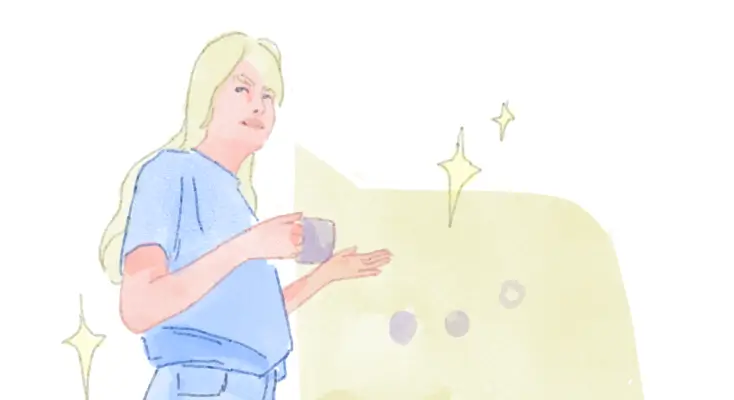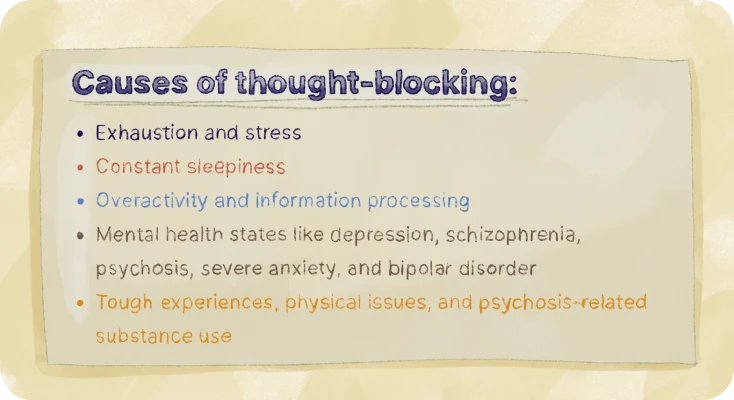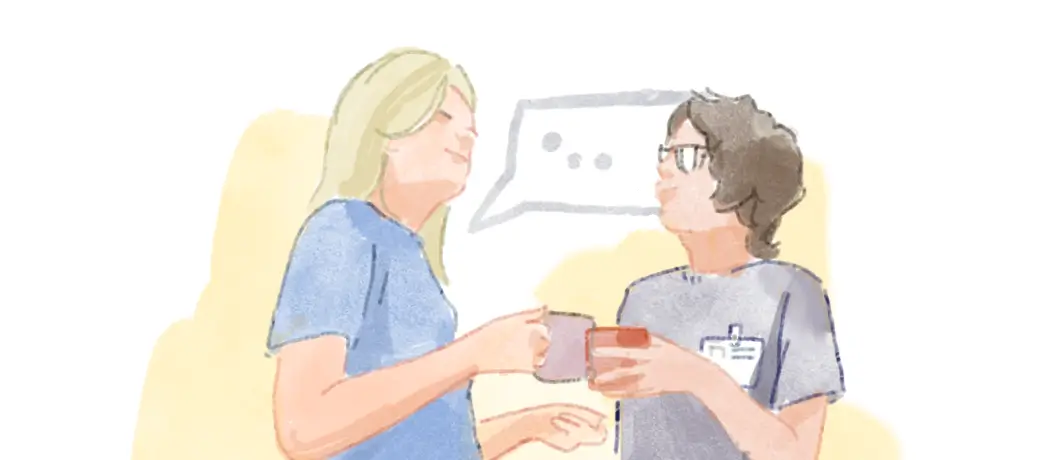Podcast name
Thought blocking
Imagine you’re sharing with a friend about your weekend, detailing the activities you did and the people you met. Then, you were about to say something intriguing about someone that knocked you out and… your mind just went blank. It was right on the tip of your tongue, and now it’s being swept away.
If you often ask yourself, “Why do I stop talking mid-sentence?” and want to know more about thought blocking, this article is for you.
What is thought blocking?
In psychology research, thought blocking is defined as a process where your thoughts suddenly stop or get stuck while you’re talking or trying to express yourself [1]. It can make you pause in the middle of a sentence or stay silent for a while, leaving others wondering what’s going on.
Stopping talking in mid-sentence and thought-blocking differs
Also, we need to understand that stopping talking in mid-sentence and constantly losing train of thought are not exactly the same, though they may sound similar.
You can stop talking in the middle of the conversation for many reasons, such as losing track of what you are saying, being interrupted, forgetting a word, etc. It’s a common thing, and it doesn’t necessarily mean a psychological or neurological issue.
On the other hand, thought blocking refers to suddenly stopping thinking or speaking, unable to recall the next thought or words, often because of a mental health issue. It’s not just pausing; it’s like the thought disappears.
Loss of thought can make it difficult to find the right words to end your talk, making communication quite challenging.
Thought blocking types
Besides that, the blocking thought process could be thought of in 3 main types. Let’s take a look:
- Positive thought blocking: Stopping for a moment during thoughts or speech and then continuing. For example, “I’ve been facing some challenges at work recently, but I believe with dedi… You know, it’s amazing how supportive my colleagues have been during this time.”
- Perseverative thought blocking: Someone’s thoughts keep interrupting the conversation, or they repeat the same words or ideas too much. It can be something like, “I really enjoyed the plot twist in that movie. The plot twist was so unexpected, you know? It really caught me off guard. Did I mention the plot twist? It was so surprising.”
- Irrelevant thought blocking: It happens when someone talks about one thing and suddenly shifts to another without warning. For instance, “Regarding the project timeline, we need to, oh, by the way, did anyone know it’s snowing in Antarctica? I was amused!”
Losing the train of thought is very easy. But when it becomes something that is bothering you, please seek help. Remember, taking care of your mental health is just as important as taking care of your physical health.

Causes of thought-blocking
It’s quite common to lose the train of thought while talking or forget what you were saying just a moment ago. But the guilty ones for unwanted thought blocking can be depression, exhaustion, stress, sleepiness, lack of concentration, or multitasking (such as talking on the phone while trying to solve a math equation).
It’s thought to be due to overactivity and too much information processing, although we don’t know the exact cause.
But no worries. Our mental health tool can always take care of it. With mindfulness exercises, thought tracking, and support resources, Breeze provides tools to boost your well-being.
However, there can be other reasons why you are forgetting things, such as mental disorders.
1. Schizophrenia
Schizophrenia is a lasting condition that can lead people’s minds to strange feelings, thoughts, and ways of acting. You may ask, “This is why I lose my train of thought?”. It can be. It’s not super common, affecting around 1 in 300 people worldwide. [2]
Usually starting in young adulthood, it can show up in different ways, like hearing things that aren’t there, moving differently, or having strange thoughts.
Constantly losing train of thought is quite a vivid sign of schizophrenia. Sometimes, it can even be hard to finish a thought, and speaking clearly can be tough, too.
Socializing might also become tricky. It’s important to remember that everyone experiences this differently, and help is available.
2. Psychosis
What about the thought-blocking process in psychosis? Psychosis isn’t a single illness but rather a symptom with many faces. It’s like a red flag saying something’s off, maybe from sleep deprivation, a bump on the head, or some strong meds. When it pops up, your perception of reality shifts.
You can see or hear something others don’t, lose a train of thought, feel down, anxious, or have mood swings. You might even have solid and unshakeable beliefs that don’t quite fit reality and are very suspicious of people.
It’s confusing, and you might say, “Wait, didn’t we just talk about this in the schizophrenia section?” The thing is that psychosis is one of the symptoms of schizophrenia. That’s why it feels familiar.
3. Severe anxiety
Severe anxiety happens when stress gets too much. Your heart races, your breathing gets weird, and your head pounds, making even simple things feel tough.
Sometimes, when people are extremely anxious, they can also have thought blocking. [3] This means they might feel so overwhelmed that they kind of shut down and lose track of the conversation.
For example, someone with social anxiety might feel really uncomfortable talking to other guys and might avoid social situations. While this isn’t exactly the same as blocking thought process, in extreme cases of anxiety, it can still happen from time to time.
Anxiety, depression, or negative thinking can be constant guests in your daily life. But don’t let them burn you out.
Start caring about your mental health today by using Breeze app. For instance, our shortcut courses will help you understand why you feel sad, how to overcome anxiety, and mute the “Why am I so unmotivated?” feeling.
Check in-depth tests will lead you to “a better you.” You will be able to reveal surprising truths about yourself, plus practical advice to make the most of it.
4. Bipolar disorder
Bipolar disorder is a rollercoaster of emotions, marked by extreme swings between euphoria and despair. In high periods, you might feel unstoppable, racing with thoughts, and taking big risks. In low periods, sleep becomes an escape, thinking feels cloudy, and darkness can overwhelm you.
Also, bipolar disorder can cause problems like blocking thoughts and disorganized speech, leading to difficulty communicating.

5. Other causes
Other reasons, like tough experiences (like trauma, physical issues, and substance use linked to psychosis), can make us stop talking mid-sentence about the hard stuff, causing memory gaps or trouble recalling things during emotional talks.
Being stressed, tired, having trouble focusing, or dealing with brain issues can also play a part.
Whatever the reason, it’s a good idea to ask for help if you’re often having trouble with your thoughts. Get help to understand what’s going on and find thought blocking treatment.
Thought Blocking Treatment
Suffering from thought blocking may not be the best experience, especially when it negatively impacts your life. But you can always manage it. While there’s no direct treatment for it, using the right methods can be a salvation.
First things first, talk to a doctor. Chatting with a therapist or counselor can be a great way to understand what might be causing your loss of thought.
After that, a doctor will establish a thought-blocking treatment protocol to reduce or eliminate thought-blocking. That protocol can include prescribed medications or techniques like Cognitive Behavioral Therapy (CBT), which can help you see things from a different angle and reduce stress.
Meanwhile, there are also common tips that will make you feel better and lighten your mental load.
- Take a break. Sometimes, a simple step away can refresh your mind. Go for a walk, grab a coffee, or do some quick stretches.
- Talk it out. Sharing your thoughts and feelings with a trusted friend or family member can help you see things from a new perspective.
- Creative move. Draw, write, or listen to music. Engaging your senses can be a second wind for your stuck thoughts.
- Yes to mindfulness. Taking a few deep breaths or practicing simple meditation can calm your mind and make it easier to focus.
- Use a mental health app. Thought blocking is tough. But trying Breeze will help organize your thoughts, transform negativity, and rediscover the vibrancy of life.
Katherine Pocock, Clinical Neuropsychiatrist, MBPsS, shared some insights about thought blocking
“Thought blocking can be a confusing and frustrating experience. We all experience forgetfulness and distraction, but thought blocking is more intense; it may feel like your brain has completely switched off from the conversation. While not yet well defined or understood in the medical field, problems with thought blocking should be treated seriously – please consult a medical or mental health professional if you feel impacted by thought blocking.”Wrapping up
It’s one thing to stop talking mid-sentence because we are interrupted or forget what we were going to say. But when a thought has vanished, and there’s no way to retrieve it, it’s time to take action.
Now that you understand what thought blocking is and its possible impact, you can take steps to manage it.
So, are you ready to reclaim your thought flow? Breeze, our wellness app, can be your first step. Invest in yourself and get Breeze today. Remember, your health is the foundation for everything else.
Sources:
- Koutsoukos, E., & Angelopoulos, E. (2018). Indication of Disrupted Temporal Structure in the Case of Thought Blocks in Schizophrenia: The Role of the Metastable Balance. Behavioural neurology, 2018, 4031207. https://doi.org/10.1155/2018/4031207
- Institute of health Metrics and Evaluation (IHME). Global Health Data Exchange (GHDx). (Accessed 25 September 2021)
- Alonso J, Liu Z, Evans-Lacko S, et al. Treatment gap for anxiety disorders is global: results of the World Mental Health Surveys in 21 countries. Depress Anxiety. 2018;35(3):195–208.
Disclaimer
This article is for general informative and self-discovery purposes only. It should not replace expert guidance from professionals.
Any action you take in response to the information in this article, whether directly or indirectly, is solely your responsibility and is done at your own risk. Breeze content team and its mental health experts disclaim any liability, loss, or risk, personal, professional, or otherwise, which may result from the use and/or application of any content.
Always consult your doctor or other certified health practitioner with any medical questions or concerns
Breeze articles exclusively cite trusted sources, such as academic research institutions and medical associations, including research and studies from PubMed, ResearchGate, or similar databases. Examine our subject-matter editors and editorial process to see how we verify facts and maintain the accuracy, reliability, and trustworthiness of our material.
Was this article helpful?





